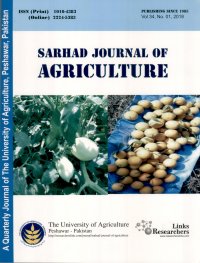Drought Tolerance Screening in Thirty Common Wheat (Triticum aestivum L.) Genotypes
Drought Tolerance Screening in Thirty Common Wheat (Triticum aestivum L.) Genotypes
Ajmalud Din1*, Munir Ahmad2, Fahad Masoud Watto2, Sheraz Ahmed1, Imtiaz Ali1 and Muhammad Kausar Nawaz Shah2
ABSTRACT
Drought stress is a serious threat limiting global wheat production. Adaptability of wheat genotypes to drought stress is an important objective in wheat breeding. This study was carried out to understand the effect of drought stress on growth and development, and to identify drought tolerant wheat genotypes. Thirty wheat genotypes of diverse genetic makeup were assessed in transparent polythene bags (6 × 27 inches), and filled them with sterile, homogenized mixture of loam, sand and compost soil. Two factorial Completely Randomized Design was followed with three replications and two treatments. The experiment was conducted during 2015-16 in the experimental site of the Department of Plant Breeding and Genetics, PMAS Arid Agriculture University Rawalpindi, Pakistan. Data were recorded on drought-related physiological traits viz. proline content, osmotic adjustment, excised leaf water retention (ELWR), relative water content (RWC), cell membrane stability (CMS), chlorophyll content and canopy temperature. Mean squares for all traits revealed significant differences among genotypes under moisture stress and normal environmental conditions. High variations were recorded for cell membrane stability, relative water content and osmotic adjustment which indicated the suitability of these traits as selection criterion for drought tolerance. Significant association was observed between chlorophyll and proline content. Osmotic adjustment was significantly correlated with relative water content and cell membrane stability. According to obtained results, genotypes NARC-09, AUR-10, SA-75, Mexipak and AUR-09 were identified as drought-tolerant, hence can serve as a good source in wheat breeding programs to develop high yielding varieties for arid, drought and rainfed areas.
To share on other social networks, click on any share button. What are these?







